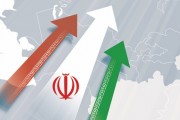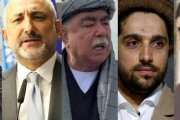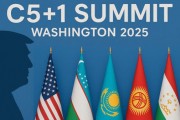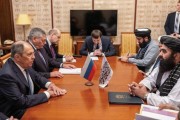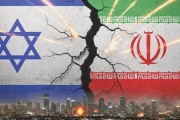Publish Date
Tuesday 3 June 2025 - 11:35
recommended
0
Interview with Sergei Kozhemyakin
The Establishment of Jolani’s Government in Syria: Implications for Central Asia
It would be naïve to assume that Ankara or Washington spent millions of dollars for years financing and arming the "Syrian opposition" simply because of their selfless love of democracy. Their investments were undoubtedly made with clear strategic objectives. The first goal—overthrowing the government of Bashar al-Assad—has effectively been achieved. Now we are entering a new phase, one in which yesterday’s jihadists will be deployed against Iran, as well as against Russian and Chinese interests. This scenario has already been put into motion. Today, Central Asian nationals present in Syria are merely waiting for an opportunity to participate in a new adventure—designed in foreign capitals—that will be carried out against other nations, including those in Central Asia.
IESS’ Exclusive Interview with Sergei Kozhemyakin, Regional Political Analyst and Political Commentator at Pravda, Moscow
10 Minutes Reading
To explore this complex and sensitive issue, the Central Asia Working Group of the Institute for East Strategic Studies (IESS) conducted an exclusive interview with Dr. Sergei Kozhemyakin, an expert on regional political affairs and a political commentator at Pravda newspaper in Moscow.
IESS: When Hay’at Tahrir al-Sham first came to power in Syria, it triggered serious security concerns in Central Asia. Have those concerns diminished due to the group’s apparent change in behavior under Jolani’s leadership, or do they still persist?
Kozhemyakin: Overall, in recent years, public concern about the situation in Syria—and more broadly, West Asia—has decreased within the information space of Central Asian republics. But this is not due to the disappearance of the source of concern. Rather, it's because other problems have emerged, which currently have more direct impact on the region. These include the tariff war initiated by Washington, the intensifying China-U.S. rivalry, efforts to resolve the Ukraine conflict, and the easing of anti-Russian sanctions. More recently, tensions between India and Pakistan have also come into play.
Nonetheless, I hope that political leaders and relevant experts in the region continue to pay attention to Middle Eastern affairs, since developments there could play a major role in Central Asia's security. Careful monitoring of this situation can help shape better policy decisions and proactive measures to preserve regional stability.
Today, Syria has turned into a breeding ground for religious extremism due to foreign intervention. Numerous radical militant groups—including thousands of Central Asian nationals—have gathered in the country, who are being used as political tools by foreign powers. Their main objective is to confront the "Axis of Resistance"—which includes the Syrian government, Hezbollah, and Iraqi Popular Mobilization Forces. These groups are also being used to destabilize Iran by supporting separatist and extremist activities.
In broader terms, these groups are tools to preserve the influence of the West and its allies in a wider region including both Central and Western Asia. They can be used to pressure local elites into accepting Western-led initiatives. Additionally, these groups can serve as instruments to destabilize China’s Xinjiang region. There are various signs signaling that governments in the region are aware of the dangers emanating from Syria, including recent moves by Central Asian leaders to relatively distance themselves from Turkish foreign policy projects, as well as the first meeting of regional intelligence service chiefs held in Tashkent in April of this year.
The self-declared government led by Abu Mohammad al-Jolani has not significantly changed its policies. Syria's new authorities have legitimized terrorist groups and integrated them into their armed forces, while violently repressing ethnic and religious minorities. They are clearly executing the directives of foreign powers. One clear example is their stance on Israeli attacks: Jolani and his associates have taken no action to confront hostile forces operating in southern Syria, nor to protect Syrian territory from attack. Instead, they have even sent peace signals to Israel. On May 7, Jolani publicly admitted that negotiations with Israel were being held with the mediation of the United Arab Emirates. The fact that this statement was made during his official visit to Paris is further evidence of the extent of foreign influence on the current Syrian government. It confirms that present-day Syria is effectively under the control of external powers and may be used at any moment to serve their interests.
IESS: A recent video was released in Russian in which some members of HTS declared jihad against Russia and Iran. Do you believe these actions will intensify? What implications could this have for Central Asia?
Kozhemyakin: Such developments were entirely predictable. They show that Syrian militants—even those considered "legitimate" today—are still the same loyal instruments of their sponsors that they were before 2024. It would be extremely naïve to believe that Ankara or Washington invested millions of dollars in funding and equipping the “Syrian opposition” simply because of their selfless love of democracy. Their investments were clearly linked to defined strategic objectives.
The first of these—toppling Bashar al-Assad’s government—has already been accomplished. We have now entered a new stage in which yesterday's jihadists are to be used against Iran, as well as against Russian and Chinese interests. This scenario has long been underway. Turkey, for example, has used its affiliated groups to pursue geopolitical goals in Libya and the Caucasus. ISIS has also been employed against Iraq and Lebanon. These precedents will undoubtedly be replicated.
To this end, the so-called "democratic" sponsors of Abu Mohammad al-Jolani have not demanded the disbandment or disarmament of extremist factions. On the contrary, these groups have been allowed to become the foundation of the new Syrian army. Leaders from these groups—including individuals from the Uyghur, Albanian, and Tajik communities—have been appointed to command positions in the new army. The forces under their control are simply waiting for the opportunity to participate in a new externally-designed campaign, which will likely be directed against countries such as those in Central Asia.
Currently, the operational space of these groups is restricted by Iran. However, the West will likely attempt to remove this obstacle by using jihadist groups and other tools. Even now, we are witnessing increased activity by extremist groups in Afghanistan. ISIS, the East Turkestan Islamic Movement (ETIM), and other organizations maintain direct links to bases in Syria. Their main area of activity is northern Afghanistan, adjacent to three Central Asian countries: Tajikistan, Uzbekistan, and Turkmenistan. These groups are already assessing vulnerabilities along regional borders and are simply awaiting the order to launch military or destabilizing operations.
IESS: What have been the most important actions taken by Central Asian countries to counter and respond to the threats originating from Syria in various security, political, economic, and socio-cultural domains?
Kozhemyakin: Significant progress has now been made compared to the 2010s, when the region first faced the threat of terrorism stemming from West Asia. First, regional integration has improved. Central Asian countries have realized that they cannot tackle threats and challenges alone. While the pace of convergence still has room for improvement, the fact that regular summits are being held and coordination is taking place at the level of economic and security institutions is a step forward. These collaborations have particularly helped ease border disputes between Tajikistan and Kyrgyzstan—an issue that used to be a serious factor of instability in the region.
Second, the defense capabilities of the regional countries have strengthened, and the capacities of their security forces have increased. This progress is largely tied to the cooperation carried out within the framework of the Collective Security Treaty Organization (CSTO). The republics of the region conduct joint military drills, and border infrastructure along the Tajikistan-Afghanistan border has somewhat improved—though much still remains to be done.
Third, Central Asian governments have become more vigilant and sensitive regarding social and cultural issues related to religion. Monitoring of religious organizations, mosque sermons, and religious education has been strengthened. Efforts have been made to counter the influence of Salafi ideology in these countries, although these efforts have not always been consistent or coordinated. At times, short-term political motives overshadow national security interests. For example, some local elites, seeking to benefit from relations with Gulf monarchies or Turkey, allow these countries to build mosques and implement other religious projects. In fact, the outcomes achieved so far are not sufficient to create a strong barrier against the dangerous currents at play. By pursuing a “multi-vector” foreign policy and trying to please various global powers, regional governments are also paving the way for foreign interference—including its destructive effects.
Additionally, high levels of poverty, inequality, and corruption persist in these countries, creating fertile ground for the spread of extremist ideas. Thus, Central Asian governments still face many security challenges, and how they address these issues will determine the future of the region.
IESS: How have the events in Syria—especially the involvement of a significant number of Central Asian citizens (with Turkey’s direct involvement) in the “Hay’at Tahrir al-Sham” group—affected relations between Turkey and Central Asia?
Kozhemyakin: On the official level, relations between Turkey and Central Asian countries have remained unchanged. Turkish officials and most regional governments continue to emphasize close cooperation and friendly ties. However, the developments in Syria and Turkey’s role in them have led Central Asian leaders to reassess their perspective on the concept of “Turkic unity.” This experience has shown that such unity does not always come without political goals or specific interests, and that Turkey may take strategic decisions based on its own interests.
One indication of this shift was the stance of these countries on the issue of Northern Cyprus. In 2022, during a summit of the Organization of Turkic States (OTS) in Samarkand, this unrecognized entity was granted observer status in the organization. This was seen as a major success for Ankara, as Turkey places high importance on Northern Cyprus, particularly in relation to its claims over gas reserves on the Eastern Mediterranean shelf. Following this, Ersin Tatar, the President of Northern Cyprus, began attending summits of the Turkic States Organization—for instance, the most recent one in Bishkek in November last year.
However, recent developments have not been favorable for Turkey. Central Asian countries supported UN Security Council resolutions condemning the unilateral declaration of the Turkish Republic of Northern Cyprus. Kazakhstan agreed with Greek Cypriot officials to open embassies mutually. Uzbekistan and Turkmenistan also took similar steps, appointing their ambassadors to Italy as their diplomatic representatives in Nicosia. All of this happened shortly after the shift of power in Syria. It’s likely that the Central Asian countries were signaling to Ankara that “Turkic unity” has its limits and that they are unwilling to participate in Turkey’s geopolitical games.
It is unlikely that Turkey will accept such a setback quietly. It may intensify its economic initiatives and propose profitable projects to the region—such as transferring energy to the West. Turkey may also resort to other methods, including increased pressure via extremist groups, even from within Afghanistan. Therefore, Central Asian governments must remain vigilant in their dealings with Turkey.
IESS: Some citizens of Central Asia—especially Tajiks—have been appointed to managerial positions in the new Syrian government. In your view, how might this development affect the situation in Central Asia?
Kozhemyakin: This development indicates that the new Syrian government—contrary to the claims of Abu Muhammad al-Julani and his allies—does not intend to solve Syria’s problems, but rather pursues other goals. Appointing Tajik, Uyghur, and other foreign militants to administrative positions is evidence that the plans of foreign actors to promote controlled instability via Syria are still ongoing. Their goal is clear: to create levers of influence across vast parts of the West and Central Asian regions.
The terrorists who traveled from different countries to Syria remain in contact with their home nations and have not abandoned their objectives. Some terrorist attacks in Central Asian countries—such as Kyrgyzstan, Kazakhstan, and Tajikistan—can be traced back to these groups. They have openly declared their intent to bring jihad back to their home countries. Now that they are trained in Syria and have access to weapons and resources, this goal has become more attainable for them. On the other hand, after the fall of Bashar al-Assad’s government, the Syrian government as well as financial aid from Western and Arab countries have effectively fallen into the hands of these extremist groups.
It is not unlikely that Trump administration may consider relying on these forces to destabilize the situation in Xinjiang. Let’s not forget that during his previous presidency, the U.S. sought to politically pressure Beijing by inciting separatist movements in China. In that context, the issue of “Muslim forced labor camps” was raised, Western media repeatedly highlighted “human rights violations” in Xinjiang, Tibet, and Hong Kong, and support for Taiwan increased. Given the intensifying confrontation between Washington and Beijing, a return to such a scenario may occur soon. Some evidence even suggests that the U.S. plans to utilize Syrian militants in its strategies—for example, the easing of U.S. sanctions on them and the recent visit of the new Syrian foreign minister, al-Shaibani, to Washington.
IESS: Many European countries, as well as Turkey, have recognized the Julani-led government and established formal relations with it. Is there a prospect for Central Asian countries to also recognize the HTS government?
Kozhemyakin: Western countries have specific and clear interests in Syria. These include using Syria as leverage to pressure Iran and China, as well as pursuing profitable economic projects—such as constructing a gas pipeline from Qatar to Europe. For instance, France has taken control of the Latakia port. Turkey, too, makes no secret of its expansionist plans. It effectively controls northern Syria and is gradually taking over other parts of the country—including its economy, transportation routes, and even its military structure.
It is very likely that Turkish officials will try to persuade Central Asian countries to recognize the Ankara- backed Syrian government. This effort would resemble Turkey’s previous attempts to have the Turkish Republic of Northern Cyprus accepted into the Organization of Turkic States. Western capitals may also make similar efforts. However, I hope the leaders of the region possess enough independence and determination to resist these pressures. Otherwise, their commitment to fighting extremism will be seriously called into question.
10 Minutes Reading
The Establishment of Jolani’s Government in Syria: Implications for Central Asia
In recent decades, regional developments in the Middle East—particularly in Syria—have significantly affected the balance of power and security dynamics in other regions. One of the most pressing and sensitive issues has been the consolidation of power by armed groups such as the Jolani government and Hay’at Tahrir al-Sham (HTS) in Syria. Their influence not only raises concerns within Syria and its neighboring regions, but also poses serious challenges for Central Asia. These developments have impacted regional and international relations of Central Asian countries, while also highlighting the growing role of radical Islamist groups. Considering the high number of Central Asian nationals involved in extremist organizations in Syria, this can lead to major security threats for the region.To explore this complex and sensitive issue, the Central Asia Working Group of the Institute for East Strategic Studies (IESS) conducted an exclusive interview with Dr. Sergei Kozhemyakin, an expert on regional political affairs and a political commentator at Pravda newspaper in Moscow.
IESS: When Hay’at Tahrir al-Sham first came to power in Syria, it triggered serious security concerns in Central Asia. Have those concerns diminished due to the group’s apparent change in behavior under Jolani’s leadership, or do they still persist?
Kozhemyakin: Overall, in recent years, public concern about the situation in Syria—and more broadly, West Asia—has decreased within the information space of Central Asian republics. But this is not due to the disappearance of the source of concern. Rather, it's because other problems have emerged, which currently have more direct impact on the region. These include the tariff war initiated by Washington, the intensifying China-U.S. rivalry, efforts to resolve the Ukraine conflict, and the easing of anti-Russian sanctions. More recently, tensions between India and Pakistan have also come into play.
Nonetheless, I hope that political leaders and relevant experts in the region continue to pay attention to Middle Eastern affairs, since developments there could play a major role in Central Asia's security. Careful monitoring of this situation can help shape better policy decisions and proactive measures to preserve regional stability.
Today, Syria has turned into a breeding ground for religious extremism due to foreign intervention. Numerous radical militant groups—including thousands of Central Asian nationals—have gathered in the country, who are being used as political tools by foreign powers. Their main objective is to confront the "Axis of Resistance"—which includes the Syrian government, Hezbollah, and Iraqi Popular Mobilization Forces. These groups are also being used to destabilize Iran by supporting separatist and extremist activities.
In broader terms, these groups are tools to preserve the influence of the West and its allies in a wider region including both Central and Western Asia. They can be used to pressure local elites into accepting Western-led initiatives. Additionally, these groups can serve as instruments to destabilize China’s Xinjiang region. There are various signs signaling that governments in the region are aware of the dangers emanating from Syria, including recent moves by Central Asian leaders to relatively distance themselves from Turkish foreign policy projects, as well as the first meeting of regional intelligence service chiefs held in Tashkent in April of this year.
The self-declared government led by Abu Mohammad al-Jolani has not significantly changed its policies. Syria's new authorities have legitimized terrorist groups and integrated them into their armed forces, while violently repressing ethnic and religious minorities. They are clearly executing the directives of foreign powers. One clear example is their stance on Israeli attacks: Jolani and his associates have taken no action to confront hostile forces operating in southern Syria, nor to protect Syrian territory from attack. Instead, they have even sent peace signals to Israel. On May 7, Jolani publicly admitted that negotiations with Israel were being held with the mediation of the United Arab Emirates. The fact that this statement was made during his official visit to Paris is further evidence of the extent of foreign influence on the current Syrian government. It confirms that present-day Syria is effectively under the control of external powers and may be used at any moment to serve their interests.
IESS: A recent video was released in Russian in which some members of HTS declared jihad against Russia and Iran. Do you believe these actions will intensify? What implications could this have for Central Asia?
Kozhemyakin: Such developments were entirely predictable. They show that Syrian militants—even those considered "legitimate" today—are still the same loyal instruments of their sponsors that they were before 2024. It would be extremely naïve to believe that Ankara or Washington invested millions of dollars in funding and equipping the “Syrian opposition” simply because of their selfless love of democracy. Their investments were clearly linked to defined strategic objectives.
The first of these—toppling Bashar al-Assad’s government—has already been accomplished. We have now entered a new stage in which yesterday's jihadists are to be used against Iran, as well as against Russian and Chinese interests. This scenario has long been underway. Turkey, for example, has used its affiliated groups to pursue geopolitical goals in Libya and the Caucasus. ISIS has also been employed against Iraq and Lebanon. These precedents will undoubtedly be replicated.
To this end, the so-called "democratic" sponsors of Abu Mohammad al-Jolani have not demanded the disbandment or disarmament of extremist factions. On the contrary, these groups have been allowed to become the foundation of the new Syrian army. Leaders from these groups—including individuals from the Uyghur, Albanian, and Tajik communities—have been appointed to command positions in the new army. The forces under their control are simply waiting for the opportunity to participate in a new externally-designed campaign, which will likely be directed against countries such as those in Central Asia.
Currently, the operational space of these groups is restricted by Iran. However, the West will likely attempt to remove this obstacle by using jihadist groups and other tools. Even now, we are witnessing increased activity by extremist groups in Afghanistan. ISIS, the East Turkestan Islamic Movement (ETIM), and other organizations maintain direct links to bases in Syria. Their main area of activity is northern Afghanistan, adjacent to three Central Asian countries: Tajikistan, Uzbekistan, and Turkmenistan. These groups are already assessing vulnerabilities along regional borders and are simply awaiting the order to launch military or destabilizing operations.
IESS: What have been the most important actions taken by Central Asian countries to counter and respond to the threats originating from Syria in various security, political, economic, and socio-cultural domains?
Kozhemyakin: Significant progress has now been made compared to the 2010s, when the region first faced the threat of terrorism stemming from West Asia. First, regional integration has improved. Central Asian countries have realized that they cannot tackle threats and challenges alone. While the pace of convergence still has room for improvement, the fact that regular summits are being held and coordination is taking place at the level of economic and security institutions is a step forward. These collaborations have particularly helped ease border disputes between Tajikistan and Kyrgyzstan—an issue that used to be a serious factor of instability in the region.
Second, the defense capabilities of the regional countries have strengthened, and the capacities of their security forces have increased. This progress is largely tied to the cooperation carried out within the framework of the Collective Security Treaty Organization (CSTO). The republics of the region conduct joint military drills, and border infrastructure along the Tajikistan-Afghanistan border has somewhat improved—though much still remains to be done.
Third, Central Asian governments have become more vigilant and sensitive regarding social and cultural issues related to religion. Monitoring of religious organizations, mosque sermons, and religious education has been strengthened. Efforts have been made to counter the influence of Salafi ideology in these countries, although these efforts have not always been consistent or coordinated. At times, short-term political motives overshadow national security interests. For example, some local elites, seeking to benefit from relations with Gulf monarchies or Turkey, allow these countries to build mosques and implement other religious projects. In fact, the outcomes achieved so far are not sufficient to create a strong barrier against the dangerous currents at play. By pursuing a “multi-vector” foreign policy and trying to please various global powers, regional governments are also paving the way for foreign interference—including its destructive effects.
Additionally, high levels of poverty, inequality, and corruption persist in these countries, creating fertile ground for the spread of extremist ideas. Thus, Central Asian governments still face many security challenges, and how they address these issues will determine the future of the region.
IESS: How have the events in Syria—especially the involvement of a significant number of Central Asian citizens (with Turkey’s direct involvement) in the “Hay’at Tahrir al-Sham” group—affected relations between Turkey and Central Asia?
Kozhemyakin: On the official level, relations between Turkey and Central Asian countries have remained unchanged. Turkish officials and most regional governments continue to emphasize close cooperation and friendly ties. However, the developments in Syria and Turkey’s role in them have led Central Asian leaders to reassess their perspective on the concept of “Turkic unity.” This experience has shown that such unity does not always come without political goals or specific interests, and that Turkey may take strategic decisions based on its own interests.
One indication of this shift was the stance of these countries on the issue of Northern Cyprus. In 2022, during a summit of the Organization of Turkic States (OTS) in Samarkand, this unrecognized entity was granted observer status in the organization. This was seen as a major success for Ankara, as Turkey places high importance on Northern Cyprus, particularly in relation to its claims over gas reserves on the Eastern Mediterranean shelf. Following this, Ersin Tatar, the President of Northern Cyprus, began attending summits of the Turkic States Organization—for instance, the most recent one in Bishkek in November last year.
However, recent developments have not been favorable for Turkey. Central Asian countries supported UN Security Council resolutions condemning the unilateral declaration of the Turkish Republic of Northern Cyprus. Kazakhstan agreed with Greek Cypriot officials to open embassies mutually. Uzbekistan and Turkmenistan also took similar steps, appointing their ambassadors to Italy as their diplomatic representatives in Nicosia. All of this happened shortly after the shift of power in Syria. It’s likely that the Central Asian countries were signaling to Ankara that “Turkic unity” has its limits and that they are unwilling to participate in Turkey’s geopolitical games.
It is unlikely that Turkey will accept such a setback quietly. It may intensify its economic initiatives and propose profitable projects to the region—such as transferring energy to the West. Turkey may also resort to other methods, including increased pressure via extremist groups, even from within Afghanistan. Therefore, Central Asian governments must remain vigilant in their dealings with Turkey.
IESS: Some citizens of Central Asia—especially Tajiks—have been appointed to managerial positions in the new Syrian government. In your view, how might this development affect the situation in Central Asia?
Kozhemyakin: This development indicates that the new Syrian government—contrary to the claims of Abu Muhammad al-Julani and his allies—does not intend to solve Syria’s problems, but rather pursues other goals. Appointing Tajik, Uyghur, and other foreign militants to administrative positions is evidence that the plans of foreign actors to promote controlled instability via Syria are still ongoing. Their goal is clear: to create levers of influence across vast parts of the West and Central Asian regions.
The terrorists who traveled from different countries to Syria remain in contact with their home nations and have not abandoned their objectives. Some terrorist attacks in Central Asian countries—such as Kyrgyzstan, Kazakhstan, and Tajikistan—can be traced back to these groups. They have openly declared their intent to bring jihad back to their home countries. Now that they are trained in Syria and have access to weapons and resources, this goal has become more attainable for them. On the other hand, after the fall of Bashar al-Assad’s government, the Syrian government as well as financial aid from Western and Arab countries have effectively fallen into the hands of these extremist groups.
It is not unlikely that Trump administration may consider relying on these forces to destabilize the situation in Xinjiang. Let’s not forget that during his previous presidency, the U.S. sought to politically pressure Beijing by inciting separatist movements in China. In that context, the issue of “Muslim forced labor camps” was raised, Western media repeatedly highlighted “human rights violations” in Xinjiang, Tibet, and Hong Kong, and support for Taiwan increased. Given the intensifying confrontation between Washington and Beijing, a return to such a scenario may occur soon. Some evidence even suggests that the U.S. plans to utilize Syrian militants in its strategies—for example, the easing of U.S. sanctions on them and the recent visit of the new Syrian foreign minister, al-Shaibani, to Washington.
IESS: Many European countries, as well as Turkey, have recognized the Julani-led government and established formal relations with it. Is there a prospect for Central Asian countries to also recognize the HTS government?
Kozhemyakin: Western countries have specific and clear interests in Syria. These include using Syria as leverage to pressure Iran and China, as well as pursuing profitable economic projects—such as constructing a gas pipeline from Qatar to Europe. For instance, France has taken control of the Latakia port. Turkey, too, makes no secret of its expansionist plans. It effectively controls northern Syria and is gradually taking over other parts of the country—including its economy, transportation routes, and even its military structure.
It is very likely that Turkish officials will try to persuade Central Asian countries to recognize the Ankara- backed Syrian government. This effort would resemble Turkey’s previous attempts to have the Turkish Republic of Northern Cyprus accepted into the Organization of Turkic States. Western capitals may also make similar efforts. However, I hope the leaders of the region possess enough independence and determination to resist these pressures. Otherwise, their commitment to fighting extremism will be seriously called into question.
News code:4039





